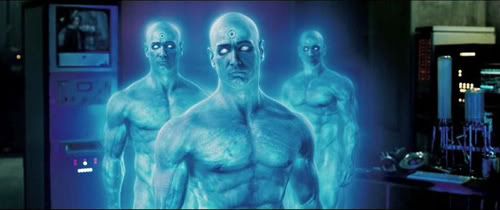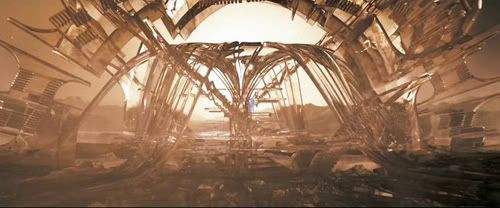
It is nearly impossible to separate Zack Snyder's Watchmen from its source material, the landmark 80s comic miniseries written by Alan Moore and drawn by Dave Gibbons. In Snyder's film, Moore's words find a new home, as do Gibbons' images, the framings reproduced with impeccable accuracy. Incidents are shuffled around and altered, dialogue is sometimes changed, and everything is necessarily condensed from the density and complexity of Moore's original work. But as adaptations go, this is, like Snyder's 300 before it, an extraordinarily faithful translation of a work from one medium to another. Snyder's faithfulness makes him reliant on his source material in a way few great directors are. Frank Miller's 300 is a truly nasty, fascistic piece of work, a comic that manages to be both homophobic and homoerotic at once; Snyder's adaptation followed suit, if anything amplifying the repellent qualities of Miller's worst writing. Moore's Watchmen, on the other hand, is an iconic and enduring work, a moving, sophisticated Cold War fable about the destructiveness of humanity and the hypocrisies and contradictions at the heart of the superhero archetype. To the extent that Snyder's film translates even a fraction of Moore's brilliance to the screen, the film is successful.
More than that, Snyder's Watchmen is frequently breathtaking. What comes through more than anything is how strong Alan Moore is as a writer: long passages are taken verbatim from the comic, and surprisingly they actually work on screen, coming out of the mouths of actors. Moore's prose is often verbose and heavily stylized, particularly the voiceover monologues taken from the journal entries of the psychopathic vigilante Rorschach (Jackie Earle Haley), but the writing maintains its dark wit and verve when translated off the page. The story takes place in an imagined alternate universe in which America won the Vietnam war thanks to the intervention of the god-like Dr. Manhattan (Billy Crudup), the world's one true super-powered being, a man made unfathomably powerful by a scientific accident. Dr. Manhattan's mere existence changed the status quo in many ways: Richard Nixon, riding high on post-Vietnam public acclaim, is still in office in 1985, when the story opens; Manhattan's near-omniscient intellect fostered great leaps forward in science and technology; a legislative act sent all the other non-powered superheroes, now irrelevant, into early retirement. Both the book and the film open with the murder of former costumed hero the Comedian (Jeffrey Dean Morgan), more recently a government operative. Snyder chooses to build up to the comic's famed opening page, its slow pullback from a blood-splattered smiley-face button lying in the gutter, all the way up to the high window from which the Comedian plunged to his death. Snyder draws out the fight that preceded this image, tracing its fast, brutal details. He then cuts from the smiley face to the opening credits, a montage of photographs and press clippings that cleverly establishes the contours of Watchmen's imaginary world, including a hilarious variation on the famous image of a returning World War II soldier jubilantly kissing a nurse.
It's undeniable that Snyder's Watchmen is an immersive experience, a distillation of the comic into moving images, each frame packed with details and subtle in-jokes that will be especially resonant for those who know the Moore comic backwards and forwards — like the shot of Mothman getting dragged away to an asylum during the opening credits, an image that could only be puzzling to those not versed in the comic. The film is a love letter to the book it is adapted from, which is both its greatest asset and its greatest failing. Because when the film soars, as it often does, it does so on Moore's wings, and when it falters, as often as not, it does so at those points where it has attempted to leave him behind. Snyder gets a lot right: his way of visually expressing the fluidity of past, present and future that marks Dr. Manhattan's experience of the universe; the awkward middle-aged despair of Dan Dreiberg (Patrick Wilson), formerly the superhero known as Nite Owl but now only a lonely failure; the hateful rhetoric of Rorschach, a heroic crimefighter who's also a right-wing crackpot. Snyder's heavily CGI-processed images are crisp and beautiful, and yet also dark, evoking a futuristic world that is nevertheless grimy and decaying. The framings of the images are often reproduced from the comic panels, but the film's visual palette draws only perfunctorily from the art of Dave Gibbons or colorist John Higgins. Even so, the final effect is not so far from the comic's distopian worldview.

As is often the case in a work like this, where Snyder for the most part slavishly follows his source material, the points at which he diverts from the Moore/Gibbons comic are especially telling. Of course, no adaptation of a book as dense and complex as Watchmen could carry over everything to the screen, and some of Snyder's changes are obvious: he jettisons the pirate comic that served as a metatextual parallel to the main story, along with the text interludes that purport to provide excerpts from primary documents of the Watchmen universe. In many ways, Moore's comic is impossible to adapt completely to the screen, since so many of the effects he achieved could only be done in comics, depending as they do on the juxtaposition of word balloons and the layout of panels in relation to one another.
Some of Snyder's changes are thus unavoidable, and a lot of smaller plot elements are gone or significantly condensed in order to make the film come in just under three hours, already a lengthy blockbuster. Some of these changes are damaging, though: the sex scene between Nite Owl and Silk Spectre (Malin Akerman) is considerably drawn out from the comic, and laughably accompanied by Leonard Cohen's "Hallelujah." Snyder seems to have made the scene so explicit only to include some T-and-A, though the sequence's capping joke — the couple accidentally setting off the flamethrower on the front of the Nite Owl's airship at the climactic moment, a gag Moore hinted at but didn't quite deliver — nearly redeems the silliness that precedes it. Even worse, though, is that Snyder then substantially cuts the couple's post-coital conversation, which was actually the whole point of the scene in the comic: the sense of power and sexual awakening that these two former superheroes rediscover when they once more don their costumes, the transformation from ordinary nobodies with screwed-up lives into something more. Snyder seems not to have gotten the emotional and psychological undercurrents in the developing relationship between Nite Owl and Silk Spectre, seeing only the opportunity to show Akerman's naked body for an extended period of time.
More ire from Watchmen fans will likely be directed at the film's ending, which is considerably altered from the comic. In some ways, though, the film's version of the mad scheme of Adrian Veidt (Matthew Goode) is actually preferable to Moore's ending, at least as it plays out on screen: it's hard to imagine the faked alien invasion scenario of the comic being anything but silly in a film version. The problem with the film's ending is thus not necessarily in the changes it makes from the comic, but in its pacing, which is noticeably off. The comic's climactic showdown at Veidt's Antarctic stronghold is actually an anticlimax, the book's supposed heroes arriving too late to stop the ambiguous "villain" from... well, saving the world, actually, albeit through truly horrifying means. The comic's ending is a slow, elegiac cool-down, as the heroes come to the realization that they must accept the horrors they have witnessed for the good of the world: to preserve peace, they must maintain a terrible secret. This resolution is sad and low-key and quiet, and Snyder is of course adept at none of these moods. He shatters the lonely snowbound death of Rorschach with the piercing scream of the Nite Owl (a cartoonish "nooooo!" that is, believe it or not, not in the comic), and insists on inserting one more brutal beating afterwards.
Whenever Snyder runs roughshod over the subtlety and grace of moments like this, one wonders how he even got so much right in this film. And yet it's undeniable that he does. For every place where his inclinations towards slo-mo violence and grotesquerie run away with him, there's something like the beautifully executed Mars sequence, with Dr. Manhattan ruminating on his life and his understanding of the universe while creating alien designs on the red planet's surface. He has a fine cast — with the exception of the consistently flat Akerman, who is often distractingly awful — and a shiny, richly textured visual aesthetic, and he's building from one of the great works of superhero comics. And yet Watchmen could have easily been an embarrassing failure, yet another brilliant Alan Moore-scripted comic adapted into a watered-down movie. It might sound like faint praise to credit Snyder with finally making a Moore adaptation that doesn't outright suck. In fact, the film is often compelling and smart, even if just as often it seems to miss the point. Snyder has made a fascinating but flawed film that hints at the richness of its source material, suggesting though never quite realizing the depth of the heady concepts and potent ideas at its core.







0Awesome Comments!